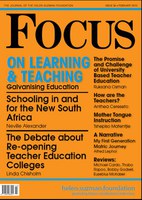There is an exciting new vibrancy in varieties of partnerships with public education. In other articles in this issue of Focus some of these will be mentioned. In this article I will discuss aspects of an intervention in which practitioners and specialists across sectors come together in an integrated hub of learning, research, service and development.


In keeping with the Foundation’s stated policy of seeking to offer a platform for both seasoned commentators and new and marginalised voices, we present this edition of Focus on Learning and Teaching.

In keeping with the Foundation’s stated policy of seeking to offer a platform for both seasoned commentators and new and marginalised voices, we present this edition of Focus on Learning and Teaching. The Foundation works from the premise that education is not only an important developmental issue, but is also a human rights issue. Beyond the central concern of personal growth, our social development and, crucially, our long-term economic development is dependent on the acquisition and availability of suitable and appropriate skills. Arguably the major constraint confronting South Africa’s growth trajectory has always been its poor human capital base.

“Parents and communities will have little say in the education of their children and teachers will have little scope to exercise individuality or originality or experiment” Helen Suzman said in 1966, opposing the Education Bill.

In the wake of Graeme Bloch’s (2009) gloomy analysis of the state of education in South Africa, The Toxic Mix, it would be difficult for anyone to deny that there is a crisis in education in our country.
Learners are often referred for psycho-educational assessments as a reactive measure because their scholastic progress is poor. They seem to be experiencing language barriers in spite of being instructed in their mother tongue; and worse, their academic self-esteem is at its lowest because of their awareness that they are struggling to cope.

The private sector is an increasingly important player in providing education services and making high quality education accessible for communities and marginalised groups in developing countries.
We write about schooling in South Africa at a time when most knowledgeable educationalists and practitioners are agreed that the educational system is in a state of chronic crisis.
During 1999, the call for re-opening teacher education colleges was made repeatedly as campaigning for the election gained momentum. It was reiterated and debated at the National Teacher Education Summit held at the end of June 2009.
Most learners in South African schools face a language barrier in the classroom. Any child who cannot use the language which he/she is most familiar with (usually the home language), is disadvantaged and unlikely to perform to the best of his/her ability.

In the last few months the media has focused sharply on failing learners, dysfunctional schools and the downfall of Outcomes Based Education.

